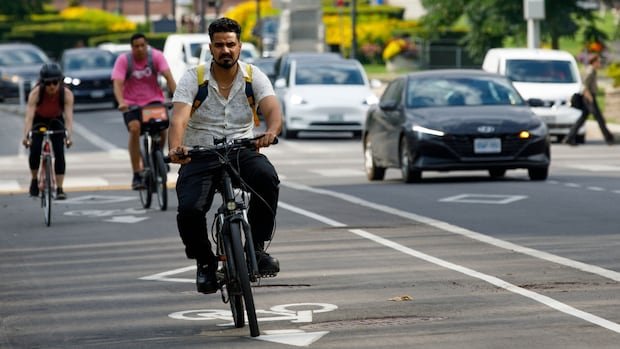An Ontario court recently declared the province’s proposal to eliminate three prominent bike lanes in Toronto as unconstitutional. The judge affirmed that Cycle Toronto and other parties successfully argued that removing these bike lanes would heighten the risk of harm and jeopardize individuals’ right to life and security.
In response to a legal challenge by Toronto cycling advocates, the Ontario Superior Court of Justice was petitioned to invalidate sections of a law that empowered the province to replace 19 kilometers of protected bike lanes on Yonge Street, Bloor Street, and University Avenue with vehicle lanes. Despite the province’s rationale of easing traffic congestion, cyclists and supporters contended that bike lanes are vital for public safety and that their removal would not resolve traffic issues.
Following a review, Justice Paul Schabas concluded that eliminating the bike lanes would not alleviate congestion. Expert testimony presented in the case highlighted the role of bicycle lanes, especially separated or protected ones, in reducing motor vehicle traffic congestion by offering a safer transportation alternative for all road users.
In a written statement, Schabas emphasized that reverting lanes to accommodate cars would not lead to reduced congestion but rather encourage more car usage, resulting in potential long-term congestion. Subsequently, a spokesperson for Transportation Minister Prabmeet Sarkaria announced that the government intends to challenge the court’s decision.
Amid the unfolding legal proceedings, six cyclists lost their lives in Toronto the previous year, all incidents occurring on roads lacking protected bike lanes. However, no cyclist fatalities have been reported this year according to Toronto police data. Additionally, census data from 2021 indicated a significant percentage of people commuting via bicycles in areas with bike lanes, underscoring the importance of these cycling infrastructures for urban mobility.
The executive director of Cycle Toronto expressed elation over the court ruling, emphasizing the significance of local decision-making and the positive impact on bicycle riders in the city. Despite the legal setback, a coalition of business owners and residents in Etobicoke expressed disappointment with the court’s decision, advocating for the removal of bike lanes in their area.
Toronto Mayor Olivia Chow reinforced the importance of bike lanes for public safety and opposed the province’s plans to override the city’s jurisdiction in matters regarding infrastructure. The city council’s stance against the removal of bike lanes aligns with their commitment to addressing congestion through various measures, including investing in public transit infrastructure.
The cost implications of removing the targeted bike lanes in Toronto were estimated at $48 million in a city report, underscoring the financial considerations associated with altering existing cycling infrastructure. The ongoing dialogue between the city and the province will likely shape the future of urban transportation policies in Toronto.

